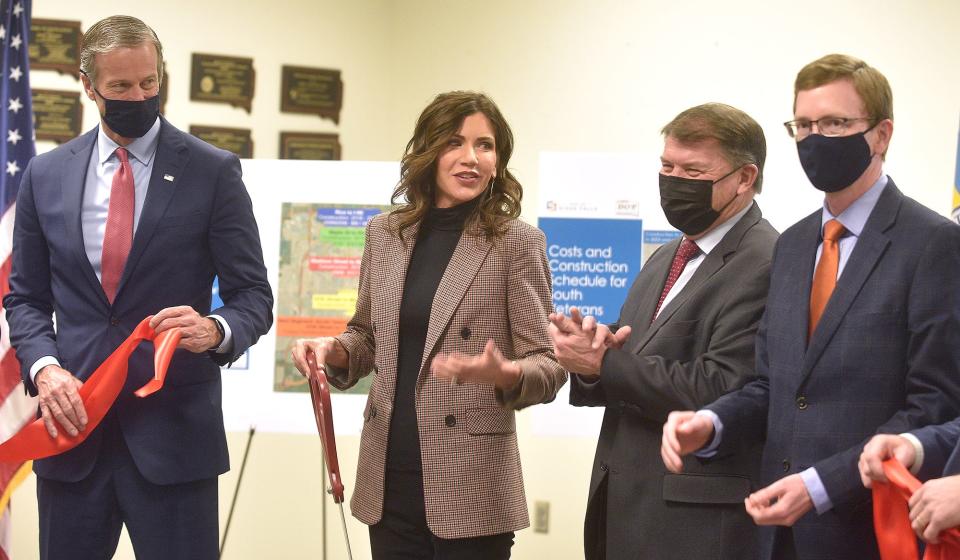Why South Dakota's congressional delegation didn't support the Respect for Marriage Act
- Oops!Something went wrong.Please try again later.
South Dakota’s congressional delegation did not support recent legislation to federally protect same-sex and interracial marriages, and require all U.S. states to recognize them. But that legislation, the Respect for Marriage Act, is set to be signed by President Joe Biden on Tuesday.
Rep. Dusty Johnson, Sen. Mike Rounds and Sen. John Thune say they didn’t support the legislation because it doesn’t provide enough protections for religious individuals or institutions that only support heterosexual relationships.
They all recently voted against the Respect for Marriage Act for those reasons, despite its bipartisan support in both the House and Senate.
However, USA Today reports the act can’t be used by the IRS to revoke the tax-exempt status of churches that don't support same-sex marriage, according to multiple legal experts. It explicitly says the opposite. The bill also does not apply to private businesses, but rather addresses government behavior on both the state and federal level. The law cannot be used by the IRS to act against churches that refuse to perform same-sex marriages.
The bill doesn’t guarantee the right to marry, but makes it so other states have to recognize same-sex marriage across state lines and entitles same-sex couples to the same federal benefits as heterosexual couples.
Biden is set to sign the legislation Tuesday, and Susan Williams, executive director of the South Dakota Transformation Project, a nonprofit supporting transgender, Two Spirit and gender-nonconforming South Dakotans, was invited to Washington D.C. to witness Biden sign the act.
“Honored to have accepted this invitation,” the nonprofit posted on Twitter. “Stay tuned.”
Honored to have accepted this invitation! Stay tuned! #RespectForMarriageAct pic.twitter.com/VPy0BBKk3G
— TransformationProjectSD (@SDTransformProj) December 13, 2022
Williams told the Argus Leader it's an "honor of a lifetime" to be invited to the signing of this legislation, and that to carry the work her nonprofit does of educating, supporting and empowering transgender people and families in South Dakota to D.C. is very deep for her.
"Though we are thrilled at the signature of this important legislation, we remain disappointed that both of our Senators and our Representative chose to vote against a bill that protects the marriages of so many South Dakotans," Williams said. "We are hopeful that one day, our elected officials will embrace their LGBTQ+ and Two Spirit constituents and work to eradicate the discrimination and harm they continue to face."
Why Johnson, Rounds and Thune didn’t support the act
Johnson said if there had been a religious protection amendment attached to the bill, he would have supported it when it came up for past votes.
“If Congress is going to codify the Supreme Court’s gay marriage decision, the religious protections need to be air tight, and they weren’t,” Johnson said in a statement.
Johnson’s office pointed to a failed amendment that would’ve prohibited the federal government from retaliating against individuals or institutions that have sincerely-held “religious beliefs and moral convictions” about marriage.
His office also pointed to current language in the act that doesn’t protect the tax-exempt status or federal program access of religious schools, faith-based organizations or other non-profit entities “adhering to traditional views of marriage,” he said — namely, heterosexual marriage.

Both Rounds and Thune also said they didn’t believe the legislation was necessary as the Supreme Court’s decision in Obergefell v. Hodges guarantees same-sex couples can marry and hasn’t been overturned, which Thune said makes the need for congressional action unnecessary.
“I also had serious concerns with the insufficient religious liberty protections for individuals and faith-based institutions,” Thune said in a statement.
Rounds said the act went beyond the Obergefell decision by “infringing on First Amendment rights of individuals and religious organizations that make decisions based on their sincerely-held religious beliefs.”
He said he supported three amendments that would’ve protected religious liberties, but none of those amendments were adopted.
This article originally appeared on Sioux Falls Argus Leader: Thune, Rounds and Johnson didn't support the Respect for Marriage Act

